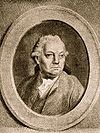- Medea (Benda)
-
Operas by Georg Benda 
Ariadne auf Naxos (1775)
Medea (1775)
Romeo und Julie (1776)
Pygmalion (1779)This article is about the opera by Georg Benda. For other meanings, see Medea (disambiguation).Medea is a melodrama in one act with five scenes by composer Georg Benda with a German libretto by Friedrich Wilhelm Gotter. The work was first performed in Leipzig at the Theater am Rannstädtertor on 1 May 1775[1].
Contents
Historical impact and musical analysis
Medea is considered to be one of Benda's best works and the composition had a significant impact on other composers of the late eighteenth century by popularizing the emerging genre of melodrama. Among those inspired by the work include Carl Philipp Emanuel Bach and Wolfgang Amadeus Mozart. Mozart in a letter to his father dated November 12, 1778 wrote, "The piece I saw was Benda’s Medea. He has composed another one, Ariadne auf Naxos, and both are really excellent. You know that of all the Lutheran Kapellmeisters Benda has always been my favorite, and I like those two works of his so much that I carry them about with me."[2] Although Mozart never wrote a full melodrama, he did create a miniature melodrama within his unfinished operetta, Zaide (1780), that is highly reminiscent of the style of Benda's Medea.[3]
Roles
Role Voice type Premiere Cast,
1775
(Conductor: – )Medea speaking role Charlotte Brandes Jason speaking role Their son speaking role Kreusa (Creusa) speaking role Housekeeper speaking role Follower speaking role Discography
- Medea (Melodrama) with conductor Christian Benda and the Prague Chamber Orchestra. Cast includes: Brigitte Quadlbauer, Hertha Schell, and Peter Uray. Released on the Naxos label in 1996.[4]
References
External links
Categories:- Operas
- German-language operas
- 1775 operas
- Operas by Georg Benda
- Melodramas
Wikimedia Foundation. 2010.

